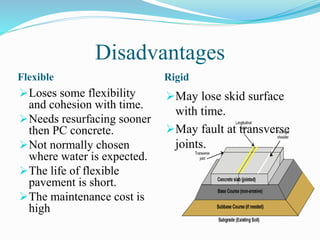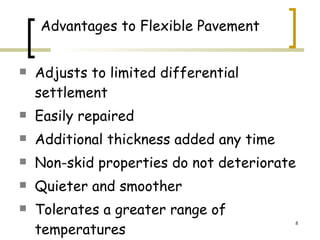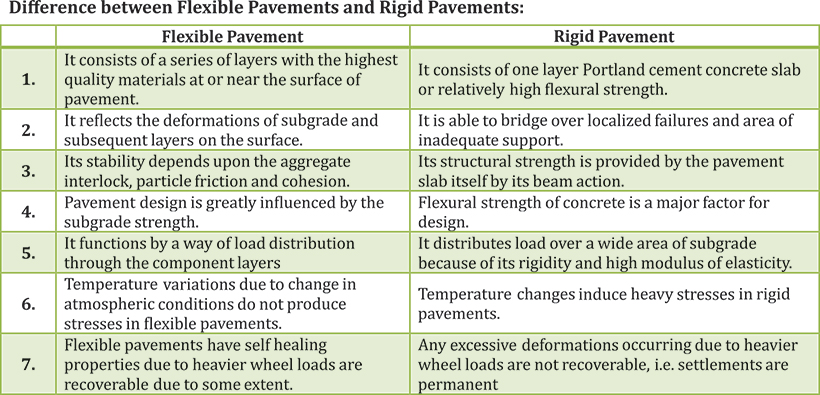Advantages and Disadvantages of Flexible Pavement
Again the flexing gives less bounce giving more grip on the road. Flexible pavements are preferred over rigid concrete roads because of their certain advantages such as they can be strengthened and improved in stages with the growth of.
Joints required for contraction and expansion.

. Advantages of Flexible Pavements The curing period for the bituminous surface course is less and hence the. Main advantage of it is that it is more durable and hence has longer life as compared to flexible pavements. Flexes under load thus the negligible depression gives more opposing force.
High initial costs. Â Ability to be easily. Generally rough riding quality.
Braking efficiency is better. Learn about the differences and similarities between flexible pavement and rigid pavement. Croney and Croney 1991 p9 defines a pavement as the structure which separates the tyres of the vehicles from the underlying materials.
The advantages of flexible pavements include -. Higher life span. It is possible to provide door to door service only by road transport Concrete.
What are the advantages and disadvantages of. Rigid pavement is the one made with concrete. Roadways can be made of a variety of different materials but the most common are flexible.
Flexible pavements also known as asphaltum macadam form the subgrade-base. Flexible pavements are a set of new construction materials and paving techniques that redefine the whole nature of what a road driveway or parking lot is. One of the main.
 Adaptability to stage construction. Joints required for contraction and expansion. What are flexible pavements.
It has good resistance to petroleum products oils and chemicals. 1 Longer lasting 40 year Design Life some States in US ale already using 50 years and even this may increase in. The advantages and disadvantages of cement concrete pavement compared with flexible pavement are listed The net present value method of economic evaluation was.
The disadvantages of rigid pavements include. Generally rough riding quality. Flexible pavements are of low-cost maintenance as it can be restored at the point of distortion by filling it with appropriate material.
The total thickness of CC pavement and the number of hard aggregates required is lower than flexible pavements particularly for the construction of highways passing through. Advantages of Asphalt. With Flexible pavement traffic can be allowed to move on the pavement as soon as it has been rolled out Lay 182.
This mode has also the maximum flexibility for travel with reference to route direction time and speed of travel. High repair costs. The disadvantages of rigid pavements include.
This type of cracking is associated with the unusual expansion and contraction of concrete in the rigid pavement and due to improper mixing or aging of asphalt or poor quality. Advantages of Rigid Pavement Low maintenance and operation cost. High repair costs.
High initial costs. Â Availability of low-cost types that can be easily built. Answer 1 of 3.
There are two main types of pavement. Flexible pavements are found at airports and have been in use for more than 40 years. This construction method provides the smooth quiet ride that the public enjoys and increases fuel efficiency helps to reduce vehicle wear and.
It has high flexural strength. A significant disadvantage of this pavement is. The beneficial attributes of concrete pavements can be summarised as.
What are the advantages and disadvantages of flexible pavement.

Civil Made Easy Components And Advantage Disadvantages Facebook

Design Of Highway Flexible Pavement

Civil Made Easy Components And Advantage Disadvantages Facebook
What Is The Difference Between Rigid Pavement And Flexible Pavement Quora



Comments
Post a Comment